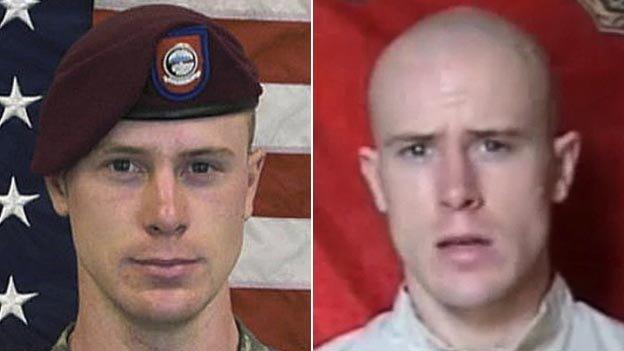Profile: Sgt Bowe Bergdahl
- Published
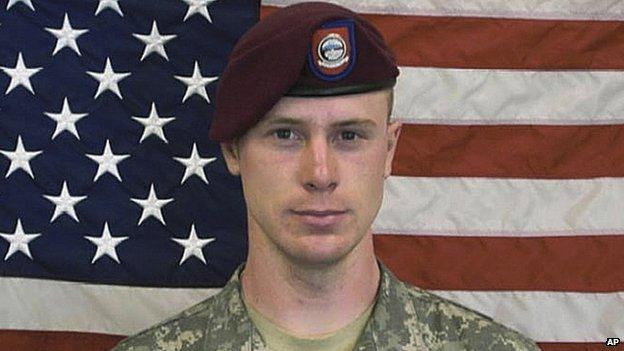
US Army Sgt Bowe Bergdahl was captured by Taliban forces in Afghanistan in June 2009
Sgt Bowe Bergdahl's five-year captivity at the hands of Taliban forces came to an end after the US secured his release in exchange for five Guantanamo Bay detainees.
The 28-year-old soldier's return has sparked a heated political row, with Republicans warning that the deal could put American lives at risk.
Fellow soldiers have also argued Sgt Bergdahl knowingly wandered away from his unit while deployed in Afghanistan in June 2009.
Now Sgt Bergdahl faces desertion and other charges by the US military for his disappearance.
Prior to his capture, the soldier with a history of odd jobs prior to his military career wrote to his parents, expressing frustration with the military.
During Sgt Bergdahl's captivity, his parents Robert and Jani became tireless campaigners for his release.
Interested in adventure
Sgt Bergdahl was born to the couple on 28 March 1986 in Idaho, where his father worked in construction.
He and his younger sister, Sky, were home schooled by their devout Calvinist parents, instructed in religion and morality.
Sgt Bergdahl was taught to shoot a rifle and ride horses by age five, and reportedly grew interested in adventure tales.
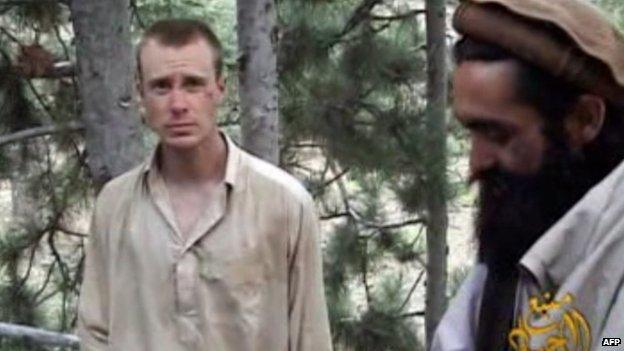
A video grab image from 2010 showed Sgt Bergdahl in captivity
At age 16, he became interested in fencing and ballet, and moved in with the family of a local girl studying dance who instructed him in Buddhism and Tarot.
By age 20, Sgt Bergdahl is said to have grown restless and requested to join the infantry force of the French Foreign Legion.
He travelled to Paris to learn French, only to later have his application rejected. The same year, he was discharged from the US Coast Guard basic training camp for reasons that remain unclear.
Upon returning to Idaho, Sgt Bergdahl worked as a barista at a local coffee shop, his interest in survivalism and combat grew.
He reportedly told a family friend about wanting to travel to Africa to teach self-defence techniques to threatened villagers.
Mounting frustration
But in 2008, Sgt Bergdahl announced he had enlisted in the Army and underwent 16 weeks of infantry school training in Fort Benning, Georgia.
He initially appeared to embrace Army life, fellow soldiers said, always reading about humanitarian causes, ethics or philosophy.
Later his unit travelled to the National Training Center in California to prepare for deployment, simulating combat situations in extreme conditions.

Jani Bergdahl (left) and Robert Bergdahl (right) have been tireless campaigners for their son's freedom
It is there, fellow soldiers say, Sgt Bergdahl began to act oddly. He garnered the nickname "Special Forces" for his perceived intensity and his propensity to keep to himself.
He is said to have told a colleague that if their upcoming deployment was "lame", he would just "walk off into the mountains of Pakistan".
In March 2009, Sgt Bergdahl's platoon arrived in Paktika, Afghanistan, a province plagued by violence.
Excerpts of journals he sent to a friend shortly before going missing, published by the Washington Post, suggest a young soldier struggling to handle the mental stress of war.
According to a detailed investigation by Rolling Stone magazine, external, Sgt Bergdahl began sending emails to his parents critical of the US and its military, to which his father instructed him to obey his conscience.
The magazine claims that on 30 June 2009, he asked his team leader if it would cause problems were he to leave the base with his sensitive equipment. His superior said yes, and the soldier then collected water, his diary, a knife and digital camera, and left.
Early the next morning, the acting platoon leader reported the soldier missing. A drone, two F-18s and a team with tracking dogs searched the area.
More than 24 hours after Sgt Bergdahl vanished, US intelligence intercepted a conversation between Taliban fighters confirming the soldier had been captured.
A Taliban propaganda video depicting the soldier was released in late July. Three others later followed showing an apparent decline in Sgt Bergdahl's physical and mental health.
Meanwhile, the Bergdahls campaigned for their son's release, sometimes speaking critically of the Obama administration for its perceived lack of action.
Sgt Bergdahl has not made any public comment since his release, but the Daily Beast website published a letter it said was one of two he sent to his parents during his captivity, through the International Red Cross.
In the letter, which the BBC has not verified, he says he left because conditions were deteriorating at the base.
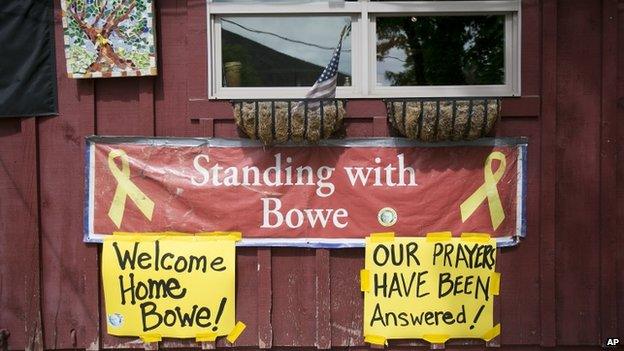
Residents of Sgt Bergdahl's hometown of Hailey, Idaho, celebrated following news of his release
Following Sgt Bergdahl's release from captivity on 31 May, top Congressional Republicans argued the deal violated US law and amounted to negotiating with terrorists - accusations denied by the Obama administration.
Meanwhile, the Army appointed a high-ranking officer to investigate the circumstances of his disappearance and capture.
On 14 July, military officials announced Sgt Bergdahl was returning to active duty.
He was to be stationed at US Army North at Joint Base San Antonio-Fort Sam Houston and live in officer quarters there, and colleagues in his duty section will provide support.
Meanwhile, US media reported Sgt Bergdahl had yet to make contact with either of his parents.
He now faces desertion charges by the US Army, after a lengthy investigation into his disappearance.
- Published2 June 2014
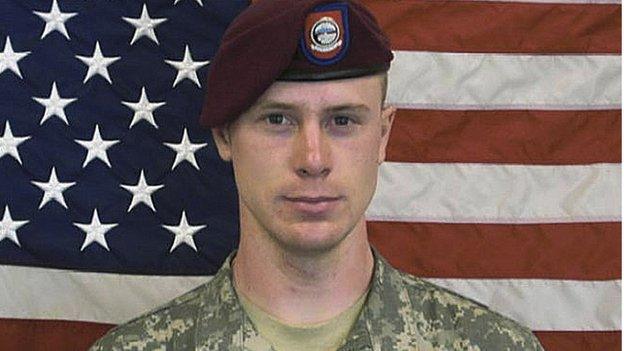
- Published16 October 2017
